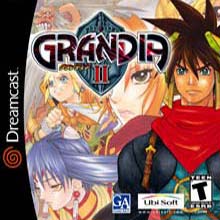| Grandia II | |
|---|---|
 North American Dreamcast cover art | |
| Developer(s) | Game Arts[a] |
| Publisher(s) | |
| Director(s) | Katsunori Saito |
| Producer(s) | Takeshi Miyaji Toshiyuki Uchida |
| Designer(s) | Osamu Harada |
| Programmer(s) | Kazuyuki Ohata Kazuhiro Irie |
| Writer(s) | Kei Shigema Yuichi Hasegawa |
| Composer(s) | Noriyuki Iwadare |
| Series | Grandia |
| Platform(s) | Dreamcast, PlayStation 2, Windows, Nintendo Switch, PlayStation 4, Xbox One |
| Release | DreamcastPlayStation 2Microsoft WindowsAnniversary Edition
|
| Genre(s) | Role-playing |
| Mode(s) | Single-player |
Grandia II[b] is a role-playing video game developed by Game Arts originally for the Dreamcast console as part of their Grandia series. Initially released in Japan by Game Arts in August 2000, the game was published by Ubi Soft in North America in December 2000 and in Europe in February 2001. Grandia II was later ported to PlayStation 2, where it was released worldwide throughout 2002, and for Windows exclusively in North America and Europe later that year.
An enhanced port, based on the Dreamcast version and titled Grandia II Anniversary Edition, was released by GungHo Online Entertainment for Steam and GOG.com in August 2015. A high-definition remaster of the game and the original Grandia was released for Nintendo Switch in August 2019; an associated update for the Anniversary Edition was released in October 2019.[7][8] The PlayStation 4 and Xbox One versions were released in March 2024.[9]
The game was developed by many of the same staff members who worked on the original Grandia, including music composer Noriyuki Iwadare. However, it was designed around creating a more "mature" product than the previous title and the first in the series to feature fully three-dimensional graphics.
The game is set in a fantasy world thousands of years after a battle between Granas, the god of light, and Valmar, the god of darkness, nearly destroyed the planet until Valmar was split into pieces and scattered across the land. In the aftermath of the battle, the Church of Granas has led humanity to prosperity by spreading the word of good. However, when a young mercenary named Ryudo is charged to protect a songstress from the church named Elena, their journey reveals that the church's history, as well as the history of the world, is not all it seems.
While the original Dreamcast version of the game received a largely positive response from critics in Japan and the West, its later ports to the PlayStation 2 and PC were typically seen as inferior due to a combination of technical shortcomings and other high-profile games released during the transition.
- ^ "dreamcast.ign.com Releases". 2000-12-02. Archived from the original on 2000-12-02. Retrieved 2023-07-31.
- ^ IGN Staff (2000-07-29). "Date Set for US Version of Grandia 2". IGN. Retrieved 2023-07-31.
- ^ IGN Staff (2002-01-30). "Grandia II Ships!". IGN. Retrieved 2023-07-31.
- ^ Adams, Dan (2002-02-25). "Grandia II Hands-on". IGN. Retrieved 2023-07-31.
- ^ Silverwolf X. "RPGFan reviews: Grandia II". RPGFan.com. Archived from the original on March 12, 2016. Retrieved May 26, 2012.
- ^ "Grandia II" (in Japanese). Sega. Archived from the original on March 18, 2014. Retrieved May 26, 2012.
- ^ "Grandia and Grandia II Coming to Switch in HD Remaster - IGN". 20 August 2018. Archived from the original on 20 May 2021. Retrieved 25 April 2021 – via www.ign.com.
- ^ @GungHo_America (1 February 2019). "We're happy to see all of the excitement for the #Grandia + Grandia II HD Remaster! We will update everyone as so…" (Tweet) – via Twitter.
- ^ "Grandia HD Collection Launches March 26, 2024 on PlayStation 4 and Xbox One". GungHo Online Entertainment. March 12, 2024. Retrieved March 12, 2024.
Cite error: There are <ref group=lower-alpha> tags or {{efn}} templates on this page, but the references will not show without a {{reflist|group=lower-alpha}} template or {{notelist}} template (see the help page).